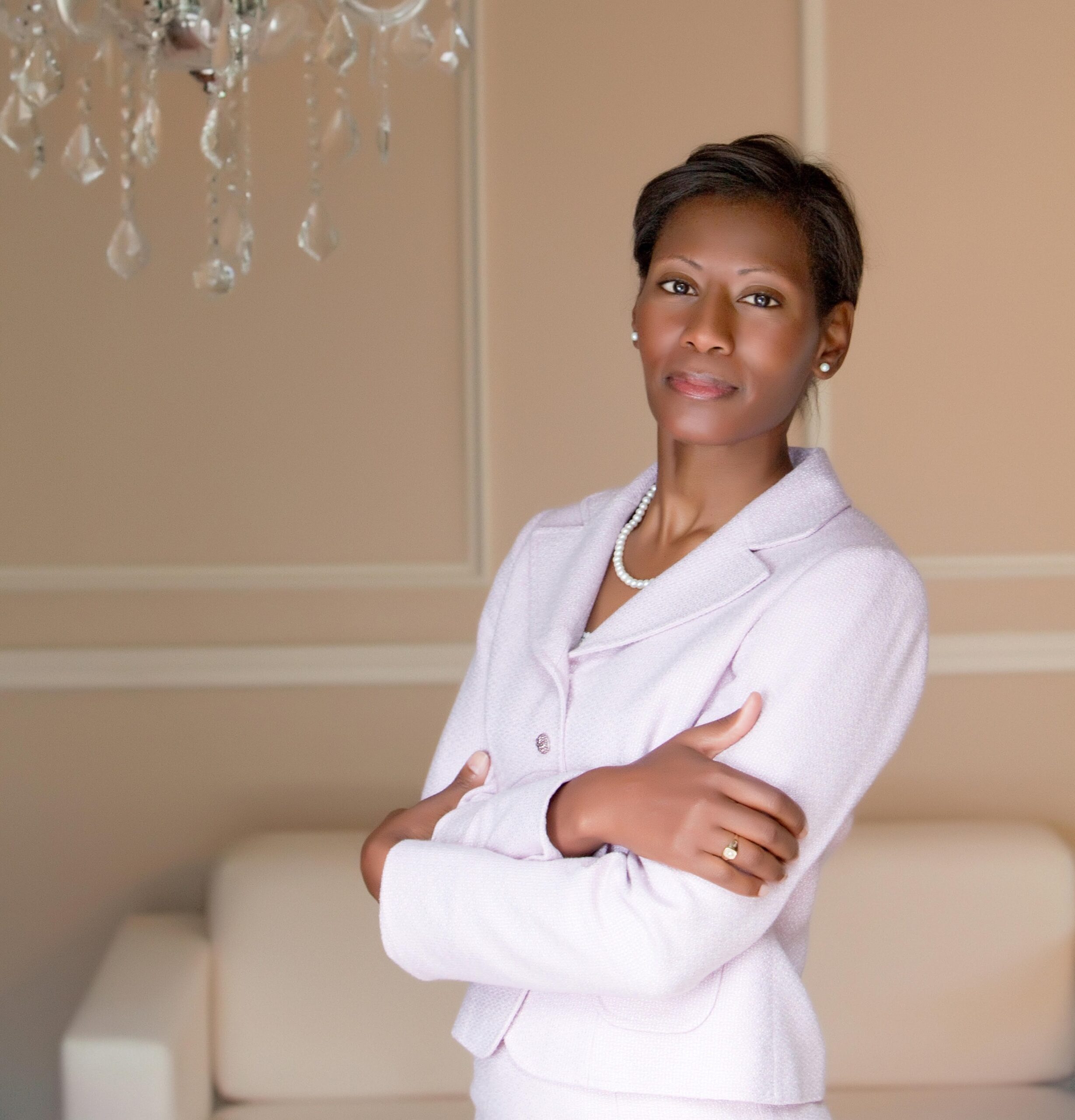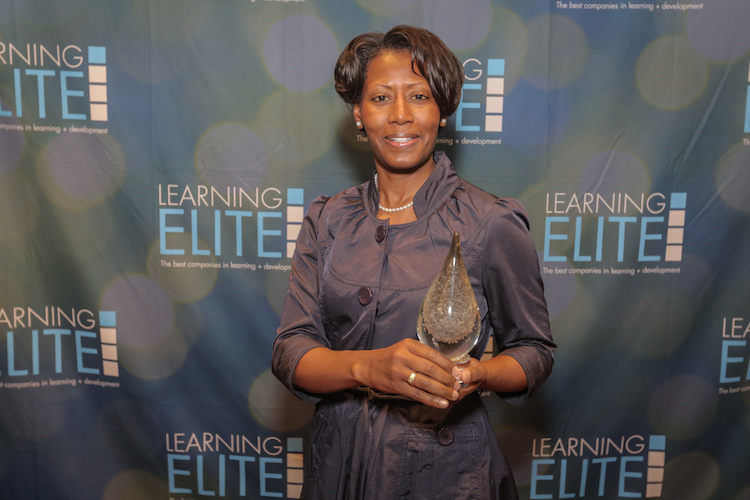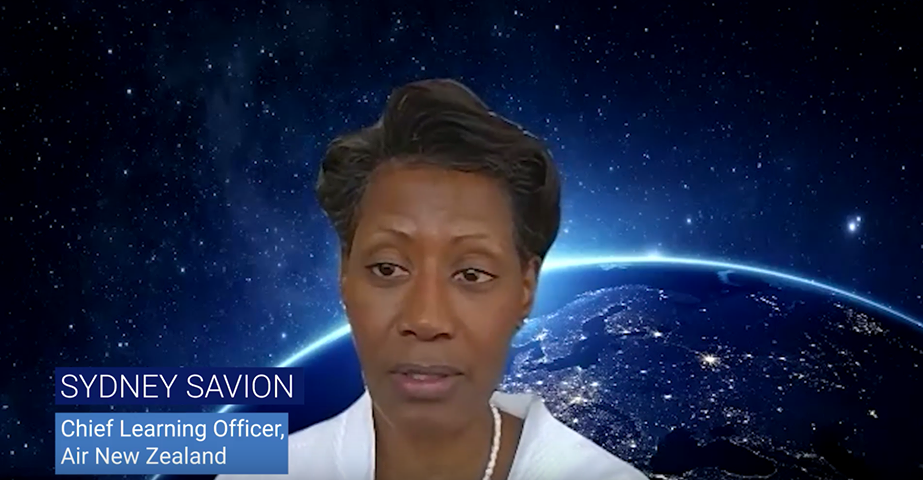
Throughout her career, including 20 years in the U.S. Air Force and various roles in corporate L&D, Sydney Savion, CLO of Air New Zealand, has learned the value of clear communication, kindness, empathy and creating a culture of belonging.
by Elizabeth Loutfi-Hipchen
January 4, 2021
Each year, the Chief Learning Officer of the Year Award is presented to an individual learning executive who delivers the most exemplary development and guidance, is a strategic business partner and provides essential leadership to the organizational learning and development function.
Last year, however, organizations asked much more of CLOs, and from learning and development as a whole. As the COVID-19 pandemic desecrated global economies, L&D was in the hot seat, with many learning leaders and teams working quickly to meet the rising demands of workforces entering a new chapter of work, from remote training, coaching and development opportunities to layoffs and outskilling.
One such leader is 2020’s award recipient, Sydney Savion, chief learning officer of Air New Zealand. Since joining the airline in 2018, Savion has been a key player in enhancing and improving its talent development and learning initiatives for roughly 13,000 employees that make up one of the country’s flagship organizations.
Bringing learning to life
The Air New Zealand CLO was experiencing an ultra-rare moment for 2020, disconnected from the virtual world during the Learning in Practice Awards ceremony on Oct. 20, when she was announced as the 2020 CLO of the Year. Savion, who had no prior idea she had won the award due to technical issues she was experiencing with her email inbox, was in the car when her phone began receiving notification after notification offering her congratulations.
In the midst of the global pandemic, Savion says she feels incredibly blessed to earn the title of CLO of the Year. Since joining Air New Zealand in 2018, Savion has led the organization’s L&D through the development and implementation of numerous innovative learning strategies and initiatives, as well as through the challenges that the learning function and the company at-large faced last year due to COVID-19.
Savion began her professional career in the U.S. Air Force, where she spent 20 years. Her last assignment was at the Joint Forces Command, in the Training, Analysis and Simulation Center, where she used advanced technology to design, develop and distribute learning globally and oversaw leadership development programs for more than 250,000 U.S. military officers and the joint forces.
She was working on research to complete her doctorate of education and human organizational learning at George Washington University when she realized that she ultimately wanted to depart the military for a career in corporate L&D. She calls it an “inflection point.”
“A dear friend of mine used to tell me that clear [communication] is kind; unclear is unkind.
”
“I thought to myself … wouldn’t it be interesting to be able to apply my education in behavioral science and experience in the military using the advanced technology to distribute learning and distribute scale to fortify learning?” Savion says. “That’s what really got me in this space. I wanted to bring learning to life in a different way in corporate.”
Her first civilian position was at Booz Allen Hamilton as a learning and performance practitioner. There, she was a problem-solver for clients who were going through a redirection or change in regards to their learning strategy.
“I was asked to help with a lot of those cases where change management was required to get people to move in the direction of the strategy,” she says. “You can have a strategy, but if you can’t get people to implement, then it’s just a piece of paper.”
Savion’s first executive L&D role was at Dell Global Support and Deployment Services, where she served as their global learning officer in 2014. Later in 2017, she stepped into the role of chief of education strategy for Dell EMC-Education Services. She became Air New Zealand’s CLO in February 2018.
Two or three weeks into her role at the airline, Savion was having a deep philosophical discussion with one of her colleagues at a team off-site event about empathy and how to best help the underrepresented population at Air New Zealand. From this conversation, Savion and her colleagues decided to join forces with a nonprofit in New Zealand to launch Project Mana, a literacy and numeracy program. Every company has an underrepresented population, Savion says, and they felt that as the human resources leadership team, they needed to provide this to their workforce.
Learning lessons
From her time in the military and her time in the civilian corporate space, Savion has picked up a number of useful lessons along the way. For starters, being very clear in your communication is probably the kindest thing that you can do as a leader, she says.
“Everybody’s unique, so what may have worked in one place might not necessarily work in this place. I think you have to have high intention; seeking to understand individuals before being understood,” she says. “A really dear friend of mine used to tell me that clear is kind; unclear is unkind.”
Savion says she has also learned the importance of being a strategic partner. Similar to the importance of diplomacy in the military, in the corporate world being a strategic partner to the business and developing meaningful and commercial relationships with business leaders is critical.
As organizations regrouped during the pandemic’s earlier stages, it began to feel like something that was more easily conquerable together than alone. During this year’s CLO Fall Symposium, Savion recalled during an Oct. 20 session how Air New Zealand was able to partner with various nonprofit organizations, corporations, higher education institutions and government groups in New Zealand as the airline faced workforce reductions and worked to come up with solutions that would be best for their people.
“When you’re losing your job, you’re thinking about feeding your family, paying a mortgage, paying your bills,” Savion says. “That’s what matters in these moments, so how do we help people land softly? It’s about trying to focus on their well-being and also their livelihoods. How do we come alongside them and support them in that journey?”
Savion follows Theodore Roosevelt’s philosophy of “People don’t care how much you know until they know how much you care.” With thousands of people losing their jobs this year in New Zealand, this could not be more true, Savion says. Kindness, belonging and empathy play a larger part in business, perhaps now more than ever.
“Air New Zealand is the iconic flagship company of this country, even though it might not be the largest … I know as leaders we feel there’s not just a desire to live out this culture, but also to model for others who are looking to [us] to do the right thing,” she says. “I think we not only have an obligation, we have a desire to try to be a good steward of our people whether they’re staying or going. That’s Air New Zealand.”
“Whether it’s military culture or corporate culture, it’s so powerful that it can outlast the CEO, the founders of the company, the building itself. Culture can be that strong.
”
A final lesson that Savion emphasizes is the need for learning agility, emotional intelligence and cultural dexterity, which are especially important to not only learning leaders but business leaders in general, whether in crisis or not, that help bring people together.
A culture of belonging
Savion considers herself a “culture of belonging” architect.
“As I think back over the arc of my life, as I was writing, doing my research for my dissertation at George Washington and interviewing my subjects, one of the things that jumped out and lept off is just this contrast between feeling like you belong and you don’t,” Savion says.One of the stories she recorded was from a subject who was about to retire. Every morning, he would take the Metrorail to work, in uniform, and he would be greeted by fellow riders. The ribbons, badge and rank displayed on his uniform made him identifiable. The next day, he took the train in his civilian clothes, and nobody acknowledged him or said hi. He said he felt invisible.
“It was so much of a contrast that it started to create this anxiety, this feeling of, ‘Am I going to belong and feel like I belong in civilian culture?’” Savion says. “Most military people find themselves at that crossroad.”
Since then, the concept and the significance of belonging has always resonated with her. Throughout her career, she says she’s seen how belonging is built through culture, and in the military, it’s also steeped in the ideas, customs and social behaviors.
“Whether it’s military culture or a corporate culture, it’s so powerful that it can outlast the CEO, the founders of the company, the building itself,” she says. “Culture can be that strong, and that’s why it’s so important, I think, to leverage that power and that energy to start cultivating this feeling of belonging.”


Looking ahead
In the upcoming year, Air New Zealand has an 800-day plan to align the organization with its mantra: Survive, Revive and Thrive, Savion says, though entering 2021, it will mostly be in the “Revive” stage, operating on a smaller scale as border restrictions loosen, routes open back up and customer confidence returns. She added that this period of time will also be an opportunity for the airline to create new sustainable products and services, and leverage digital innovation to encourage the population of New Zealand to travel for business and leisure.
New Zealand is farther along in eliminating the virus than many other countries — in part due to Prime Minister Jacinda Ardern’s aggressive response to COVID-19, as well as being a relatively smaller country and in a unique position to close most borders, further preventing the virus from coming in or leaving — though on Nov. 16, the country announced new mask rules for public transit and on planes nationwide, just as a precaution.
Like many organizations this past year, operations at Air New Zealand were pared back to only what’s business critical, Savion says. Projects like Project Mana were put in stasis as the organization served its workforce’s more immediate needs.
But in 2021, Savion says the organization has their strategy in place, with COVID-19 or without. The focus for L&D hasn’t actually been so much on keeping people engaged as it has been encouraging them to make sure they are taking care of themselves and each other while the pandemic progresses. “That’s what’s needed right now, to be honest,” Savion added. “Let’s learn from this.”




